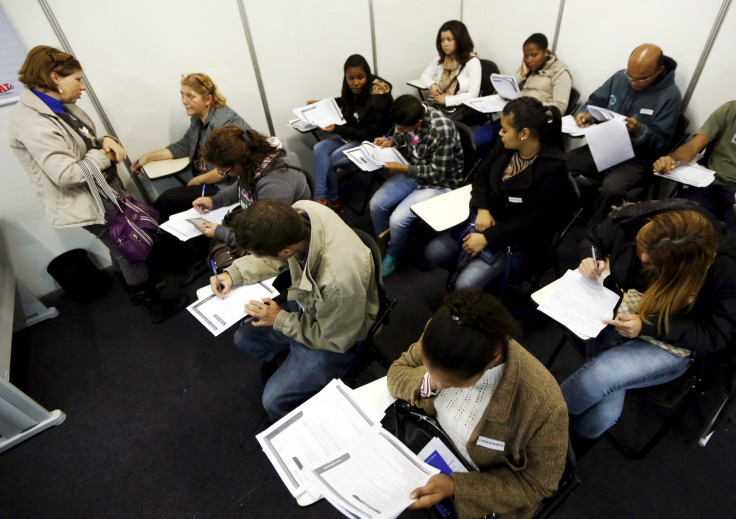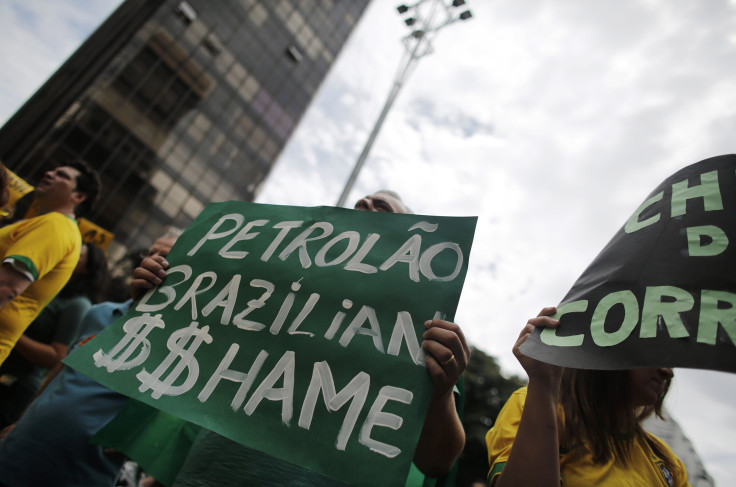Brazil Unemployment Rate Soars As Workers Brace For Tighter Economic Squeeze

João Vitor Martin Pereira, a Brazilian secondary school student living in the city of Jales in São Paulo state, still has a few years to go before he has to think about finding a full-time job. But with Brazil burrowing deeper into an economic recession this year, he already has seen the squeeze hit close to home: One by one, several members of his extended family have lost their jobs in recent months, joining a crowd of more than 8.6 million unemployed workers across the country.
Two of Pereira’s cousins, one who worked at a meat processing plant and another who had a job installing air conditioners, were laid off this year. His aunt also lost her job as a public health worker, and he expects another aunt, who works as a house cleaner, will likely be the next in line to be let go.
In the low-income area where his cousins live, “everyone who hasn’t already been laid off is pretty much afraid of being laid off,” Pereira, 17, said. “Everyone there is scared.”
Anxiety has spread quickly in Brazil this year as the unemployment rate, which stood at a record low of 4.3 percent in December, has climbed at an alarming pace. Unemployment rose to 8.6 percent in July, its highest rate since 2012, according to figures released last week by Brazil’s national statistics agency. Inflation also is on course to rise to 9.5 percent this year as the economy continues on a course to shrink by around 2.7 percent in 2015, according to a central bank survey published early Monday.
Soaring unemployment threatens to put an even tighter chokehold on Brazilian workers in the coming months as the country, once the star of emerging economies, continues to be pummeled by a perfect storm of economic and political crises that have drained investor confidence and left the government of President Dilma Rousseff scrambling for fixes. What began as a sweep of layoffs in the auto, oil and construction sectors last year, spurred by a massive corruption scandal in state-run energy company Petrobras, has since spread to other businesses that relied on those industries, and a plummeting currency has put additional pressure on companies with foreign debt. As budgets continue to get slashed, many Brazilian workers are left with little choice but to brace for rougher times to come.

Pereira considers his immediate family lucky, as his father, a bank clerk, and mother, a nurse, have managed to remain employed. But they haven’t been immune to the effects of the recession, either. His mother was let go from her job at a renowned cancer hospital last year and has since been working as a private caretaker, taking on extra work hours for lower pay. His parents have stopped buying red meat and canceled a planned vacation this year, and Pereira’s younger brother, who attends a private school, will likely have to be moved to a public school as the family scales back its budget.
“Despite all that, I think we’re still pretty well off compared to the rest of the country,” he said.
Troubles for the Brazilian economy, the seventh-largest in the world, already were brewing in recent years as China, its top trading partner, faced an economic slowdown that pushed down demand for Brazilian commodity exports like soybeans and iron ore. But the problems reached crisis levels this year amid a slump in global oil prices and a federal investigation of the sprawling bribery and kickback scheme at Petrobras that has netted arrests of dozens of politicians and unleashed public outrage over corruption.
Investigators last year found that Petrobras executives and construction magnates inflated the value of government contracts for several years in the mid-2000s, paying kickbacks to politicians in the ruling Workers' Party. The value of Petrobras shares dwindled by nearly two-thirds over the past year as the investigation continued to expand, and the company, along with construction firms implicated in the scandal, have spent months shedding contracts and thousands of employees across the country.
The cuts have delivered blows to Brazilian towns that relied heavily on the oil industry, including Macaé, the main base for Petrobras’ offshore drilling operations in eastern Rio de Janeiro state. William, an English teacher in Macaé who asked to keep his last name private because he works closely with oil companies, including employees at Petrobras, said he began receiving abrupt phone calls from his students late last year as details of the scandal started a media frenzy.
“They called me up and said, ‘I came into work this morning and got word they laid me off. I don’t even get to finish out the day,’ ” he said.
More than 1,000 jobs, mostly from third-party contractors who work with Petrobras, are still being cut each month in Macaé, although that number is still a small fraction of the 40,000 jobs that were slashed across Brazil’s major cities in August alone. William said many of his students expected the situation to get worse in the coming months.

“I would say half the Brazilian people I know want to get out,” he said. “I’ve got students who say they’re dying to find jobs in Canada or the U.S.”
Brazil is the world’s 12th-largest oil producer, and Petrobras is a major source of funding for several municipalities and institutions like schools and hospitals, so cutbacks in the oil giant have a staggering ripple effect. Renan Cavalcanta, a 24-year-old city employee in Duque de Caxias, a city in southeastern Rio de Janeiro state that relies on Petrobras as its main source of revenue, said his office had begun gradually slashing jobs in recent weeks, with about three or four layoffs expected in his department by the end of the month.
“Some people have started applications for another degree, and others started giving out CVs,” he said. “[There’s a] feeling that reeks in the place that sooner or later, you can be next.”
The global slowdown has battered emerging economies’ currencies, leaving Brazil’s real plummeting to record lows in recent weeks. That has pushed inflation up, making costs higher for workers already dealing with the threat of unemployment. It's also put an added cash squeeze on companies holding foreign denominated debt, paving the way for even more cutbacks and layoffs.
Economists project that unemployment will keep climbing in the months to come, particularly as the government continues to grapple with political deadlock that has prevented it from making the sweeping economic overhauls it needs to dig itself out of crisis. Ratings agency Standard & Poor’s downgraded Brazil’s sovereign debt last month shortly after the government posted a deficit for its 2016 budget. Rousseff has supported unpopular spending cuts and tax hikes to shore up the budget and prevent further downgrades, but opposition lawmakers have signaled that they will resist passing the measures.
“What I expect is for unemployment to reach somewhere close to the double digits within the next six to nine months,” said Monica de Bolle, an economist and visiting fellow at the Peterson Institute of International Economics, a Washington, D.C.-based research organization. “I don’t think the situation has any chance of reversing right now.” If the government manages to overcome its deadlock, the situation could turn stable by the second half of 2016, but the gloom would likely continue until then, she said.
Check out our new infographic showing #Brazil #GDP forecasts by month http://t.co/Wi0G8xUtLC pic.twitter.com/8ec1ANP2f0
— FocusEconomics (@FocusEconomics) September 30, 2015
Rousseff, meanwhile, has been battling growing calls for her impeachment as critics accuse her of corruption and squandering opportunities to streamline Brazil’s economy before the crash. Her approval rate stands at just 10 percent, according to a survey released last week by Brazilian polling firm Ibope.
Pereira said some of his relatives have directed their anger toward the president, although he doesn’t personally blame her for the economic crisis. But many of his peers, young Brazilians on the cusp of adulthood, have felt betrayed while witnessing the severity of the downturn, he said.
“There’s a feeling among some people [in my generation] that we’ve been robbed of a future,” Pereira said. “We grew up in the 2000s, and back then you would turn on your TV and the news would say the economy has been great, and people have never been richer. Now as we head to college we turn on the TV and the newsman says things have never been worse.”
© Copyright IBTimes 2025. All rights reserved.






















